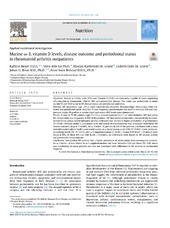| dc.contributor.author | Beyer, Kathrin | en_US |
| dc.contributor.author | Lie, Stein Atle | en_US |
| dc.contributor.author | Kjellevold, Marian | en_US |
| dc.contributor.author | Dahl, Lisbeth | en_US |
| dc.contributor.author | Brun, Johan G | en_US |
| dc.contributor.author | Bolstad, Anne Isine | en_US |
| dc.date.accessioned | 2019-04-16T09:27:05Z | |
| dc.date.available | 2019-04-16T09:27:05Z | |
| dc.date.issued | 2018-11 | |
| dc.Published | Beyer K, Lie SA, Kjellevold MK, Dahl L, Brun JG, Bolstad AI. Marine ω-3, vitamin D levels, disease outcome and periodontal status in rheumatoid arthritis outpatients. Nutrition (Burbank, Los Angeles County, Calif.). 2018;55-56:116-124 | eng |
| dc.identifier.issn | 0899-9007 | |
| dc.identifier.issn | 1873-1244 | |
| dc.identifier.uri | https://hdl.handle.net/1956/19352 | |
| dc.description.abstract | Objectives: Marine ω-3 fatty acids (FAs) and Vitamin D (VitD) are reportedly capable of down-regulating inflammation in rheumatoid arthritis (RA) and periodontal disease. This study was undertaken to relate marine FA and VitD status to RA disease status and periodontal conditions. Methods: RA outpatients (age ≥35 y) were consecutively recruited. Rheumatologic clinical data were collected and periodontal status obtained. A food frequency questionnaire was used to estimate fish and supplement intake. FA profiles in whole-blood and serum VitD levels were determined. Results: A total of 78 RA patients (age 57 ± 12 y, disease duration 15 ± 11 y) were included, 58% had active RA. Periodontitis was diagnosed in 82% of the patients, 18% had severe periodontitis. Seropositivity for rheumatoid factor and/or anticitrullinated protein antibodies was related to higher prevalence of periodontitis (P = 0.008). Seafood intake in accordance with nutritional recommendations was associated with better RA disease outcome (largest P = 0.008). An ω-3 index >8, present in 14% of the patients, correlated with a more desirable patient global health assessment scored on a visual analog scale (VAS; P = 0.004), lower periodontal probing depth (PD; P = 0.021), and ω-3 supplementation (P = 0.001). Serum VitD levels >50 nmol/L were found in 89%, of these 48% had VitD levels ≥75 nmol/L, no differences were found for RA disease activity and periodontal measurements. Conclusions: Seropositive RA patients had a higher prevalence of periodontitis than seronegative patients. An ω-3 index >8 was related to ω-3 supplementation and more desirable VAS and lower PD. VitD status was satisfactory for most patients and was not associated with differences in RA severity or periodontal diagnosis. | en_US |
| dc.language.iso | eng | eng |
| dc.publisher | Elsevier | eng |
| dc.rights | Attribution CC BY-NC-ND | eng |
| dc.rights.uri | http://creativecommons.org/licenses/by-nc-nd/4.0/ | eng |
| dc.subject | ω-3 index | eng |
| dc.subject | Seafood | eng |
| dc.subject | S-25(OH)D | eng |
| dc.subject | Rheumatoid arthritis | eng |
| dc.subject | Periodontitis | eng |
| dc.title | Marine ω-3, vitamin D levels, disease outcome and periodontal status in rheumatoid arthritis outpatients | en_US |
| dc.type | Peer reviewed | |
| dc.type | Journal article | |
| dc.date.updated | 2018-09-13T07:38:14Z | |
| dc.description.version | publishedVersion | en_US |
| dc.rights.holder | Copyright 2018 The Authors | |
| dc.identifier.doi | https://doi.org/10.1016/j.nut.2018.03.054 | |
| dc.identifier.cristin | 1603330 | |
| dc.source.journal | Nutrition (Burbank, Los Angeles County, Calif.) | |

